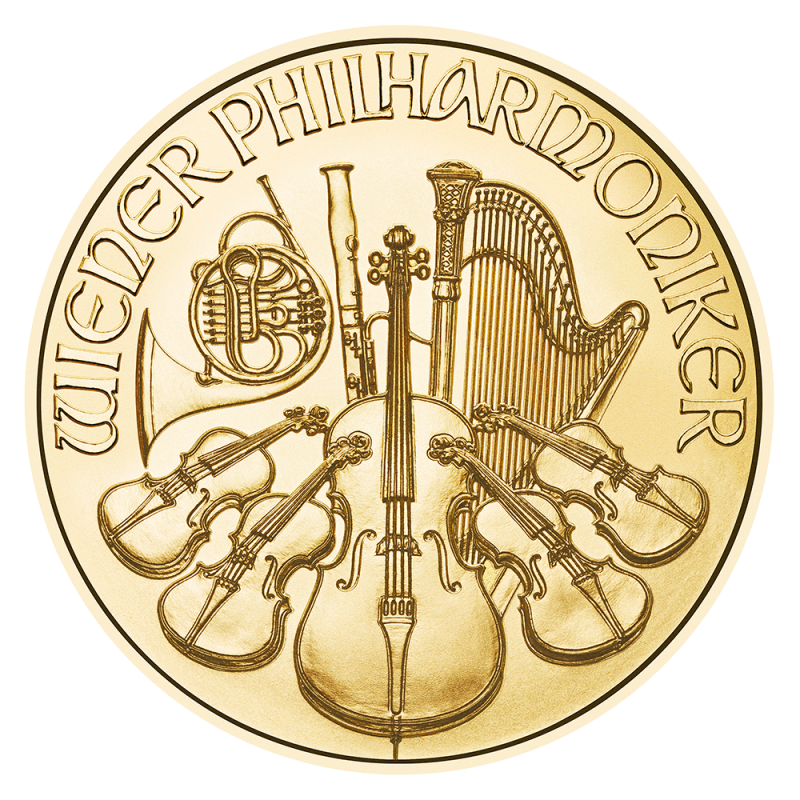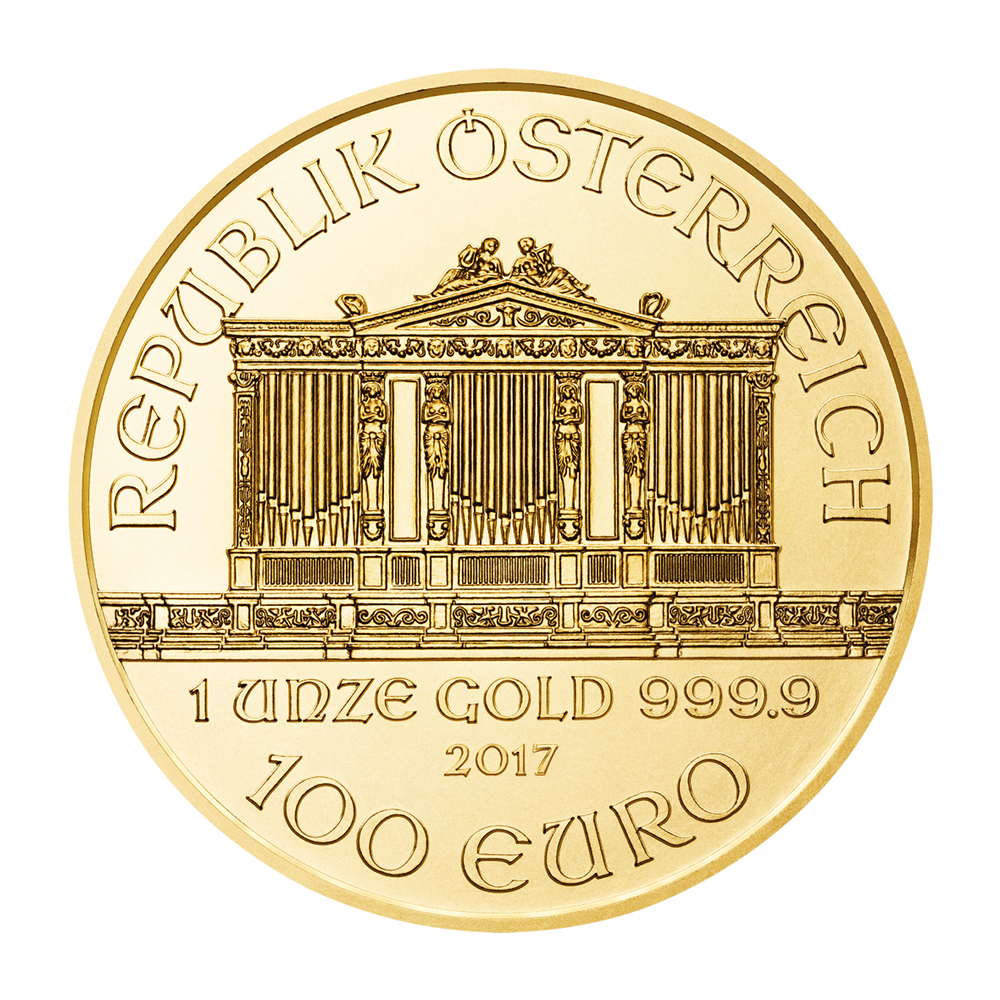Vienna Philharmonic 1oz Gold Coin | different years

Münze Österreich
Münze Österreich AG is the official mint of the Republic of Austria, based in Vienna, with origins dating back to the 12th century. It is a subsidiary of the Austrian National Bank. The mint is known for producing circulation, collector, and bullion coins. The Vienna Philharmonic is one of the world’s best-selling bullion coins in gold, silver, and platinum. The mint also offers medals, gift bars, jewelry, and a popular online shop for investors and collectors.
GPSR: Münze Österreich
Am Heumarkt 1
1031 Wien
info@muenzeoesterreich.at
+43 (1) 71715 -430
The Vienna Philharmonic is one of the most successful 1oz gold bullion coins in Europe and worldwide. With annual requirements of several hundred thousand units, the demand is consistently high since 1989. The Vienna Philharmonic gold coin consists of 24 carat gold with a fineness of 999.9/1000.
Alloy & Sizes
The Vienna Philharmonic 1oz has the fine weight of 31.103 grams and a diameter of 37.00 mm with a thickness of 2.00 mm. The nominal value of 1 (Troy-) Ounce Philharmonic is 100 euros. In previous editions before 1998 the nominal value was 2,000 Austrian schillings.
The Vienna Philharmonic 1oz gold coin has a fineness of 999.9/1000. This makes the coin insensitive to corrosion and changes in color. As we know the Krugerrand changes color over time, so this is important information to note. But 24 carat fine gold also has weaknesses, which is mainly low scratch resistance. This is because gold is a very soft precious metal. For this reason, copper was added to coins in circulation as an alloying constituent in earlier times. Copper is a very hard precious metal. In comparison to the Sovereign bullion coin which has 22 carats, with the components of 91.67% gold and 8.33% copper.
| Fineweight Oz | Fineweight Grams | Diameter | Thickness | Nominal Value |
|---|---|---|---|---|
| 1oz | 31.103 g | 32.0 mm | 2.0 mm | 100 Euro |
History
Three years after the ban on imports of the South African Krugerrand, the Austrian mint issued its own gold bullion coin on the market in 1986. They were issued in the name "Wiener Philharmoniker", which translates to Vienna Philharmonic. What no one could have guessed, was the huge success of this first purely European bullion coin.
The first edition in 1989 consisted of 351,000 units of 1oz Vienna Philharmonic and 272,000 pieces of 1/4oz gold coins. The second edition in 1990 already guaranteed the Vienna Philharmonic the title "best selling gold coin in Europe 1990". In the next few years it would become even more successful as on several occasions it became the best selling in the world. So the Vienna Philharmonic 1oz along with the Krugerrand and the Maple Leaf are among the best-selling gold bullion coins in the world.
Appearance
The design of the Vienna Philharmonic was done by Thomas Pesendorfer, he is today head of engraving at the Austria Mint. The knurled edge has a bar and ripples. Both elements ensure safety and design. The edge rod is also mandated to facilitate better stackability of the coins and also minimizes scratching on the coins surface.
Obverse
The design of the obverse is determined by the presentation of the famous organ of the Vienna Orchestra of the Golden Hall. Also on display is part of the balcony (balustrade) where the organ is. The marginal inscription on the subject is "REPUBLIk ÖSTERREICH" directly under the motive is "1 UNZE GOLD 999.9" including the year of mintage. Also in the lower area is the nominal value of "100 EURO".
Reverse
The back of the Wiener Philharmoniker 1oz shows typical instruments of classical music. You can see in the background horn, bassoon and harp. The five leading string instruments are a cello, which is shown in the middle. To the left and right from the central Cello violas can be seen next to violins. The design name of the gold coin is to be read "Wiener Philharmoniker".
Advantages & Disadvantages Vienna Philharmonic
The Vienna Philharmonic 1oz gold coin is produced in such large quantities that the premium is relatively low. Furthermore, it has the advantage of all 24 carat gold coins in that it retains the typical gold coloring, even over years the Philharmonic does not corrode. The disadvantage of the coins is the sensitivity to scratching as hard alloy components such as copper are missing. The biggest advantage of gold bullion coins but is the exemption from VAT.
Summary
- Does not corrode
- Worldwide tradable
- Recognized with banks & Bullion Companies
- One of the best monetary hedges
- Exempt from VAT
- Resistant gold coloring
- 1oz with has a low premium
- scratch-sensitive gold coin
Specifics
The Vienna Philharmonic is the first purely European gold bullion coin. In the mintage years from 1989 to 1998 the nominal value was 2,000 Schillings. To celebrate 15 years of the Vienna Philharmonic in 2004 the so called "BigPhil" was released. This limited edition coin had a total circulation of just 15 pieces. The BigPhil weighs 1000 ounces and has a diameter of 37 cm and thickness of 2 cm. It is today the heaviest European gold coin.
About the Mint
The manufacturer of the 1oz Vienna Philharmonic is the Austrian Mint. The Mint is also responsible for coining the Austrian Euro and shillings prior to 1999. Emerging from one of Europe's oldest coins, the Austrian Mint was first mentioned in documents in 1397. It is known today under the name "Wiener Hauptmünzamt", although it was renamed in Austrian Mint in 1989.
Popular Products
- Vienna Philharmonic gold coin
- Wiener Philharmoniker Silver Coin
- Austrian Euro
- Maria Theresa Thaler
Tips Vienna Philharmonic
- With the acquisition of the 1oz Vienna Philharmonic you have selected one of the best gold bullion coins in the world. But what else is there to consider when buying gold and gold coins?
- The price of the 1oz Vienna Philharmonic is composed of the current gold price and the premium. The price of gold is subject to fluctuations brought about by the free market itself. It is recommended to study the price of gold in recent years, to find the correct entry for the purchase of 1oz Vienna Philharmonics.
- The premium is determined by the Mint and subsequently by the seller.
Premium and the Reasons
The Austrian Mint incurred costs during the mintage of the coins, which are allocated to the actual price of gold. These are the production costs of the blanks (coin blanks), in which the rippled edge can be seen. Several factors are involved in the cost of actually coining gold coins. These costs include: Very expensive machinery which is used and where the die must be changed often. Other factors also include personnel costs, storage costs, security, transport costs and much more.
As a rule of thumb the 1oz Vienna Philharmonic has a premium of 3.5% to 5%. Smaller formats such as the 1/10oz can have a premium as much as 15%. Another important factor for the charge is the margin of the seller. There is of course a slight difference in premiums between precious metal dealers and banks.
Another increasing factor is the fact that current 1oz Vienna Philharmonics have a higher premium because they are sold "mint-state - uncirculated". When buying a new gold coin, which was not yet in circulation, then you need to buy mint-state uncirculated because these gold coins have not yet been taken out of their original sealed packaging.
Summarized Tips
- the current year trades at a higher premium
- smaller weights have a higher premium
- note the current gold price
- Seller premiums vary
- Note the grading
Product Details
- Manufacturer: Austrian Mint
- Country: Austria
- Karat: 24 K
- Gold: 99.99%
- Fineness: 999,9 / 1000
- Alloy: Gold
- Weight: 1oz
- Scratch resistance: bad
| Metal | Gold |
| Form | Gold Coin |
| Country of Origin | Austria |
| Issuer | Austrian Mint |
| Manufacturer | Münze Österreich |
| Series | Philharmonic |
| Purity | 999.9/1000 |
| Fineweight | 31.10 gram |
| Gross Weight | 31.10 gram |
| Denomination (oz) | 1 oz |
| Year of issue | Random |
| Grade | Brilliant |
| Condition | Circulated |
| Face value | 100 Euro |
| Thickness | 2.00 mm |
| Diameter | 37.00 mm |
| Packaging | Single in Pouch |
| Packaging Unit | 10 per tube |






